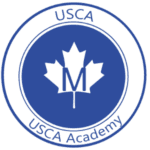| Course Type : | University Preparation |
| Credit Value : | 1.0 |
| Prerequisite : | Grade 11, Core French, (FSF3U) |
Course Description
Core French Grade 12: This course provides extensive opportunities for students to speak and interact in French independently. Students will develop their listening, speaking, reading, and writing skills, apply language learning strategies in a wide variety of real-life situations, and develop their creative and critical thinking skills through responding to and interacting with a variety of oral and written texts. They will also enrich their understanding and appreciation of diverse French-speaking communities, and will develop skills necessary for lifelong language learning.
Outline of Course Content
Unit
Titles and Descriptions
Time and Sequence
Unit 1
La Francophonie
In this introductory unit, students will review prepositions of place, and vocabulary related to “La Francophonie”, the French-speaking world. Students will practice listening skills, and will research and present on a Francophone country.
27 hours
Unit 2
Vivre ensemble
Students will explore and reflect upon controversial societal issues, and partake in various activities throughout this unit. Students will read journal articles and the novel Une bouteille dans la mer de Gaza, listen to news reports, share opinions, and write a critical summary of the novel.
27 hours
Unit 3
Les rapports sociaux dans la communauté
This unit focuses on community issues. It integrates poetry and calls to social action. Students will express their opinions in a poem at the end of the unit, and they will also create a persuasive campaign to inspire others to help those less fortunate.
27 hours
Unit 4
Les arts et la culture
With the help of discussion, a song, a visit into the cave of Lascaux, and a reading, students will reflect on the different ways humanity expresses culture through art. Students will give an oral presentation on a work of art, and express their interpretations.
27 hours
Total
110 hours
Core French Grade 12: When students are engaged in active and experiential learning, they tend to retain knowledge for longer periods and to develop, acquire, and integrate key skills more completely. Some of the teaching and learning strategies that are suitable to material taught in nutrition and health studies include:
Food Labs | Guided internet research | Direct Instructions |
Presentations | Discussion Groups | Movies and videos |
Interactive activities | Research projects | Model making |
Visuals | Multimedia presentations | Reflections |
Problem solving | Discussion groups | Interviews |
Our theory of assessment and evaluation follows the Ministry of Education’s Growing Success document, and it is our firm belief that doing so is in the best interests of students. We seek to design assessment in such a way as to make it possible to gather and show evidence of learning in a variety of ways to gradually release responsibility to the students, and to give multiple and varied opportunities to reflect on learning and receive detailed feedback.
Assessment is a systematic process of collecting information or evidence about a student’s progress towards meeting the learning expectations. Assessment is embedded in the instructional activities throughout a unit. The expectations for the assessment tasks are clearly articulated and the learning activity is planned to make that demonstration possible. This process of beginning with the end in mind helps to keep focus on the expectations of the course. The purpose of assessment is to gather the data or evidence and to provide meaningful feedback to the student about how to improve or sustain the performance in the course. Scaled criteria designed as rubrics are often used to help the student to recognize their level of achievement and to provide guidance on how to achieve the next level. Although assessment information can be gathered from a number of sources (the student himself, the student’s course mates, the teacher), evaluation is the responsibility of only the teacher. For evaluation is the process of making a judgment about the assessment information and determining the percentage grade or level.
Assessment is embedded within the instructional process throughout each unit rather than being an isolated event at the end. Often, the learning and assessment tasks are the same, with formative assessment provided throughout the unit. In every case, the desired demonstration of learning is articulated clearly and the learning activity is planned to make that demonstration possible. This process of beginning with the end in mind helps to keep focus on the expectations of the course as stated in the course guideline. The evaluations are expressed as a percentage based upon the levels of achievement.
A variety of strategies are used to allow students opportunities to attain the necessary skills for success in this course and at the post-secondary level of study. To facilitate learning, the teacher uses a variety of activities engaging the whole class, small groups, and individual students.
The assessment will be based on the following processes that take place in the classroom:
| Assessment FOR Learning | Assessment AS Learning | Assessment OF Learning |
| During this process the teacher seeks information from the students in order to decide where the learners are and where they need to go. | During this process the teacher fosters the capacity of the students and establishes individual goals for success with each one of them. | During this process the teacher reports student’s results in accordance to established criteria to inform how well students are learning. |
| Conversation | Conversation | Conversation |
| Classroom discussionSelf-evaluationPeer assessment | Classroom discussionSmall group discussionPost-lab conferences | Presentations of research Debates |
| Observation | Observation | Observation |
| Drama workshops (taking direction) Steps in problem solving | Group discussions | PresentationsGroup Presentations |
| Student Products | Student Products | Student Products |
| Reflection journals (to be kept throughout the duration of the course)Check ListsSuccess Criteria | Practice sheetsSocrative quizzes | ProjectsPoster presentations TestsIn Class Presentations |
Some of the approaches to teaching/learning include
| Strategy | Who | Assessment Tool |
| Assignments | teacher | rubric or marking scheme |
| Oral Presentations | self/peer or teacher | rubric |
| Work & Task Sheets | self /peer or teacher | checklist or rubric or marking scheme |
| Textbook Use | self or teacher | checklist |
| Teacher Led Review | self/peer or teacher | checklist |
| Performance Task | self/peer or teacher | rubric |
| Written Quiz | teacher | marking scheme |
| Written Test | teacher | marking scheme |
| Performance Task | teacher | rubric or marking scheme |
| Final Project | teacher | marking scheme |
Core French Grade 12: Assessment is a systematic process of collecting information or evidence about a student’s progress towards meeting the learning expectations. Assessment is embedded in the instructional activities throughout a unit. The expectations for the assessment tasks are clearly articulated and the learning activity is planned to make that demonstration possible. This process of beginning with the end in mind helps to keep focus on the expectations of the course. The purpose of assessment is to gather the data or evidence and to provide meaningful feedback to the student about how to improve or sustain the performance in the course. Scaled criteria designed as rubrics are often used to help the student to recognize their level of achievement and to provide guidance on how to achieve the next level. Although assessment information can be gathered from a number of sources (the student himself, the student’s course mates, the teacher), evaluation is the responsibility of only the teacher. For evaluation is the process of making a judgment about the assessment information and determining the percentage grade or level.
The assessment will be based on the following processes that take place in the classroom:
| Assessment FOR Learning | Assessment AS Learning | Assessment OF Learning |
|---|---|---|
During this process the teacher seeks information from the students in order to decide where the learners are and where they need to go. | During this process the teacher fosters the capacity of the students and establishes individual goals for success with each one of them. | During this process the teacher reports student’s results in accordance to established criteria to inform how well students are learning. |
| Conversation | Conversation | Conversation |
Classroom discussion Self-evaluation Peer assessment | Classroom discussion Small group discussion Post-lab conferences | Presentations of research Debates |
| Observation | Observation | Observation |
| Drama workshops (taking direction) Steps in problem solving | Group discussions | Presentations Group Presentations |
| Student Products | Student Products | Student Products |
| Reflection journals (to be kept throughout the duration of the course) Check Lists Success Criteria | Practice sheets Socrative quizzes | Projects Poster presentations Tests In Class Presentations |
Core French Grade 12: Assessment is embedded within the instructional process throughout each unit rather than being an isolated event at the end. Often, the learning and assessment tasks are the same, with formative assessment provided throughout the unit. In every case, the desired demonstration of learning is articulated clearly and the learning activity is planned to make that demonstration possible. This process of beginning with the end in mind helps to keep focus on the expectations of the course as stated in the course guideline. The evaluations are expressed as a percentage based upon the levels of achievement.
A variety of strategies are used to allow students opportunities to attain the necessary skills for success in this course and at the post-secondary level of study. To facilitate learning, the teacher uses a variety of activities engaging the whole class, small groups, and individual students.
Some of the approaches to teaching/learning include
Strategy | Purpose | Who | Assessment Tool |
Class discussion | Formative | Teacher/student | Observation Checklist |
Class Debates | Formative | Teacher | Rubric or marking scheme |
Daily class work | Formative | Teacher/student | Observation Checklist |
Assignments | Summative | Teacher | Rubric or marking scheme |
Written test | Summative | Student | Marking scheme |
Project | Formative | Teacher/student | Marking scheme |
Final written exam | Summative | Teacher/student | Marking scheme |


